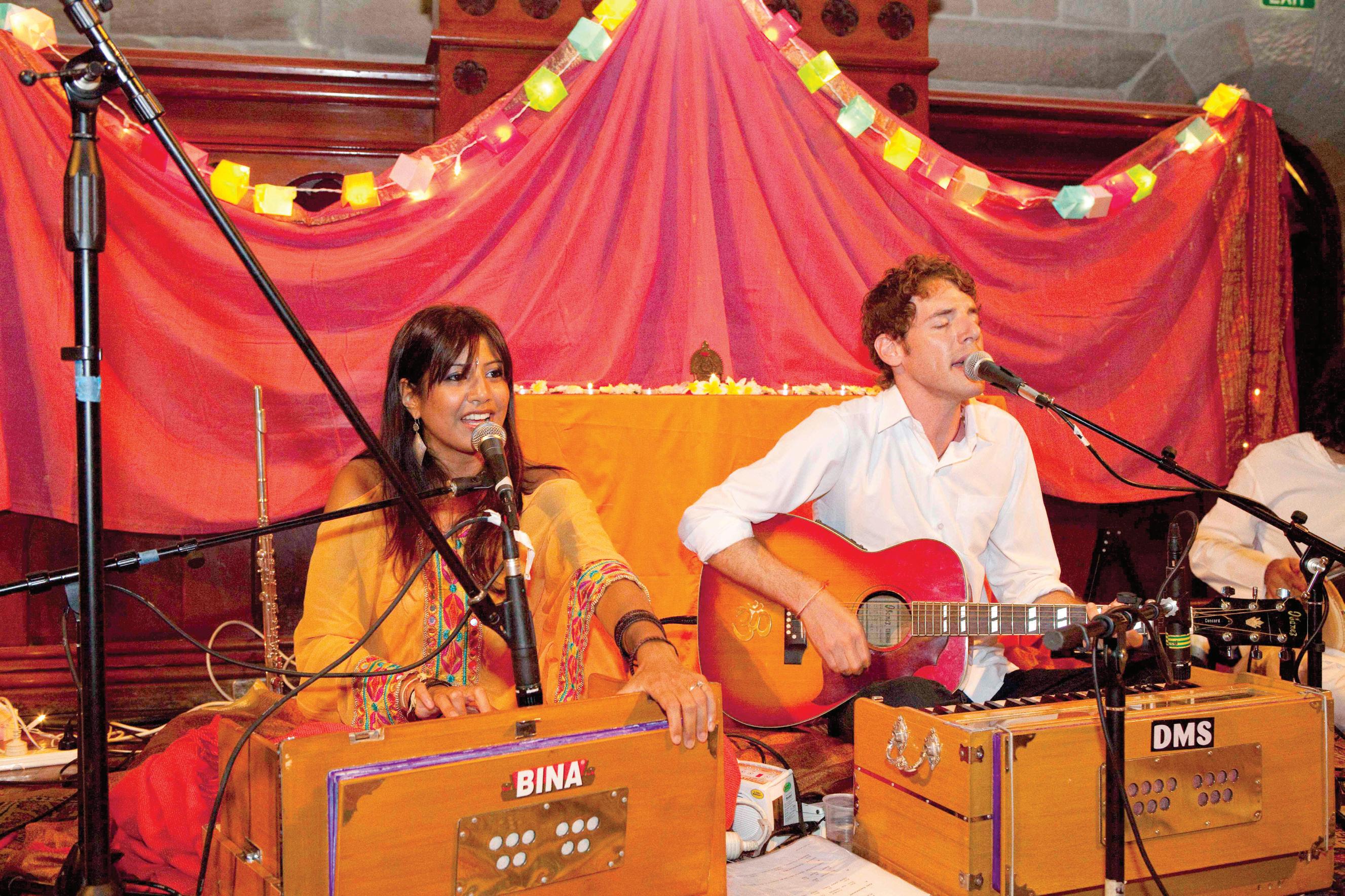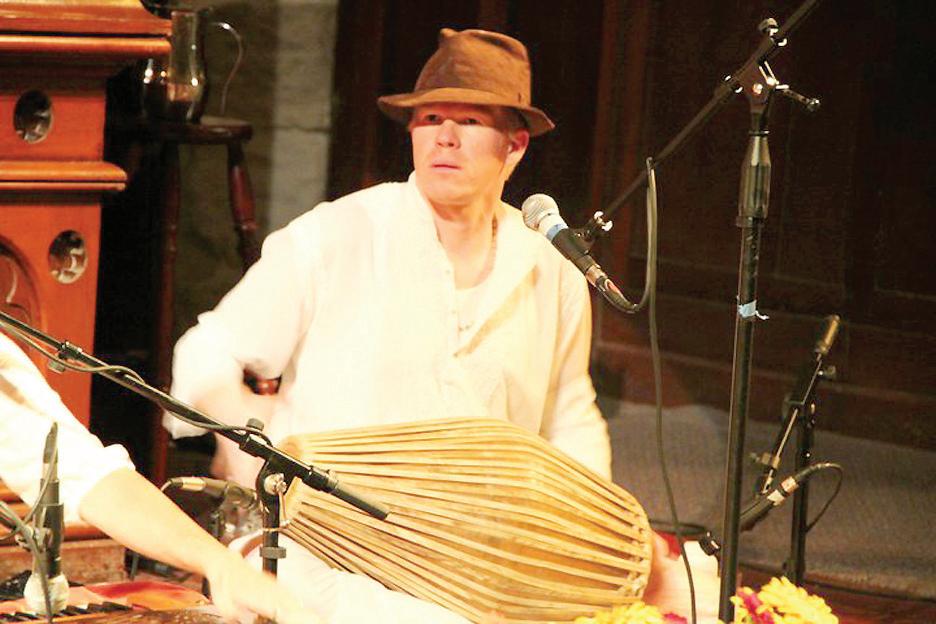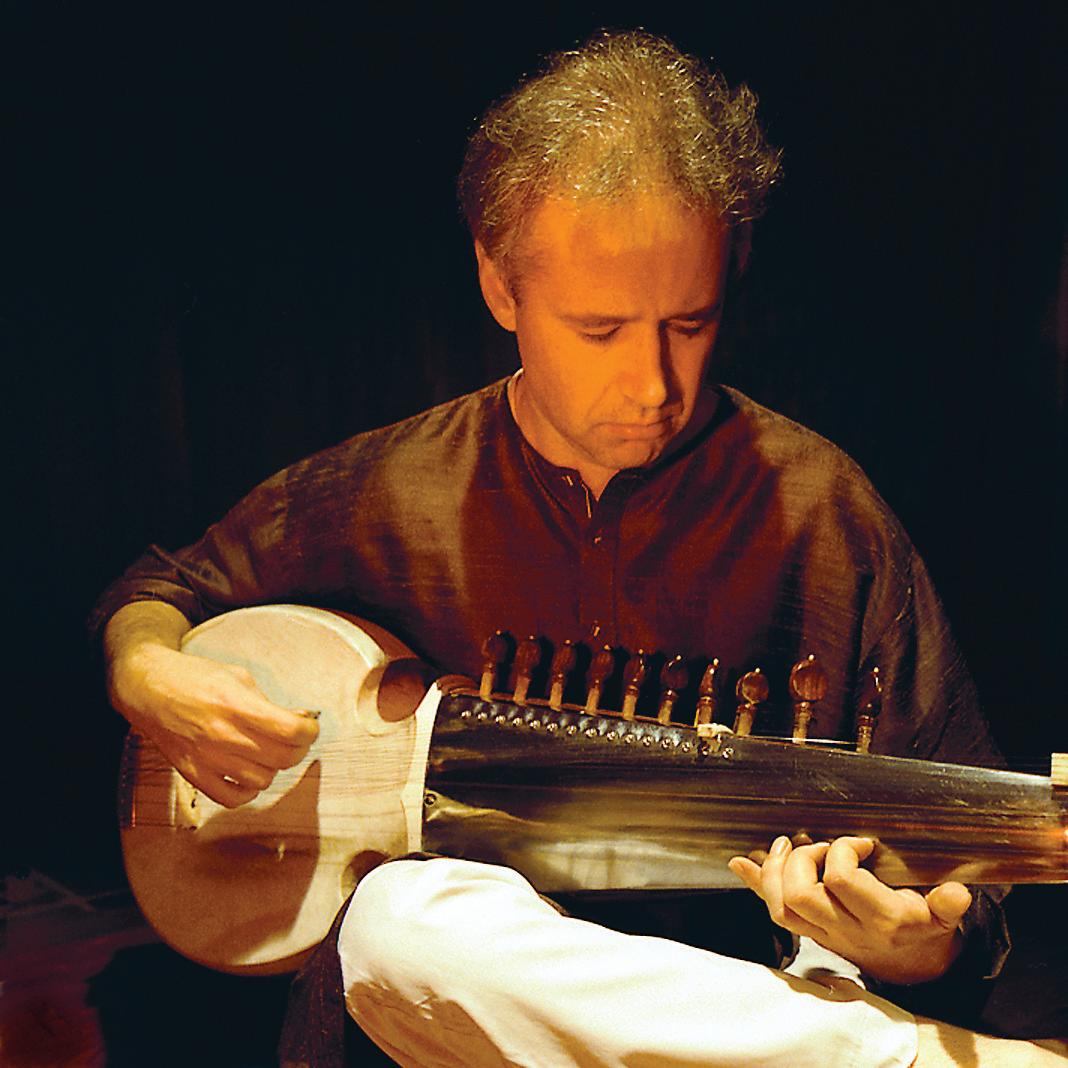
9 minute read
Building bridges through music
from 2011-04 Sydney (2)
by Indian Link
BY GAURAV PANDEY
For a long time, a small section of Australian musicians have been working to spread awareness of Indian classical music in the country. Many of them began with an inspiration that fuelled a lifetime’s passion and their journeys highlight - even savour - the importance of a quality less evident in this age of instant gratification: perseverance.
Indian classical music is one of the more popular non-Western classical music traditions. Its students go through many years of training, often under the watchful eyes of a guru, before they find their authentic voice. The credit for preserving India’s ancient music and its culturally exotic image must also go to the numerous musicians who have been performing and teaching tirelessly for years.
Propounding the classical
Among the Australian practitioners of Indian classical music, Adrian McNeil is perhaps the most recognised name. His instrument of choice – the sarod – is not easy to master, but Adrian’s discipline and effort have made him a worthy exponent.
His current role is that of Director of Higher Degree Research and Convenor of Improvisation Program at Macquarie University’s Department of Media, Music and Cultural Studies.
Adrian has undergone intensive training in Indian classical music from leading musicians for more than two decades in India. Apart from regular performances in Australia and abroad, he spends a fair bit of time in academic activities. He writes on the social and cultural history of Indian classical music, the political economy of music and improvisation in music, and has authored a much-acclaimed book on the sarod, Inventing the Sarod: A Cultural History
Adrian has a PhD in ethnomusicology and has been teaching music for many years. His own music education, though, happened under the guru shishya parampara . In an interview to Indian Link in 2007, Adrian had expressed his admiration for the tradition: “It seems that some forms of knowledge are best preserved and taught according to this method. Classical music is still very much organised around the workings of this institution and till date, it is still recognised as the best way of gaining the proper knowledge and skills to become a professional musician.”
Through his music, writings and teaching, Adrian is striving to ensure the coming generations are not deprived of the beauty of the intense notes of the sarod.
Sensational sitarist
Another Australian string instrumentalist who embodies the richness of Indian classical music is Josh Bennett. “For some reason, when I heard Indian music it excited me, and I wanted to understand it and immerse myself in it. But why Indian music touched me in particular is a mystery,” said the accomplished sitar and dilruba player whose “main musical outlet” is through string instruments – an affair that is more than 20 years old.

Being a left-hander brings with it a curious set of issues. His instruments, for instance, are either made specially or found by chance. The dilruba is an example of the latter: “I was in a music store in London, and asked the shop-keeper if he had any left-handed sitars. He didn’t, but he pulled out a left-handed dilruba that was in the corner gathering dust,” revealed Josh. He’d never heard of the dilruba before, he recalled, but “recognised it immediately” when the storekeeper demonstrated its sound. “The rest is history.” His journey, like that of many who choose to follow their passion in life, has not been a straightforward one. “Like any classical form, Indian classical music requires dedication, persistence and tens of thousands of hours of practice, which can be a challenge living in Australia where one is surrounded by a culture of fast-food and three-minute pop tunes,” said Josh.
Many of the problems faced by international musicians wanting to learn Indian classical music have begun to ease to a certain extent with more accessible international travel, video and audio recordings, and resources such as the internet. However, beyond the basic familiarity, Josh said, “You need a teacher to pass on the intricacies and subtle nuances that are almost impossible to assimilate otherwise.” He added that he had been “extremely fortunate to have a guru who has such a wealth of knowledge and is willing to pass that knowledge on to whoever has the passion to learn it.”
At the end of the day, Josh seems content with what destiny has offered him. “It is a blessed life to be able to spend my time making people happy by playing music, and without people to play for, there would be little point. I particularly enjoy exposing audiences to music that they may not otherwise come across, and present it in a way they can understand and relate to,” he said.
These days Josh is busy practicing hard on the sitar in preparation for the National Folk Festival in Canberra. He regularly performs within Australia and internationally, and is also a part of “a 60s/70s Bollywood big-band” called Bombay Royale . “Due to my familiarity with both western and Indian music, I can act as a bridge between them - like a musical translator,” he said. “My goal is it to be performing music for as many people as possible, and for as long as I’m still breathing!”
A spiritual rejuvenation
Passion can hardly be objectively defined and, in many cases, the music itself is only a sub-set of a larger, more meaningful purpose. The journey of Edo Kahn and Jo Mall, popularly known as ‘Edo and Jo’, is a fine example of this.
They have spent considerable time in the service of music and humanity and are popular among many Australians for their kirtans ; Edo has been working as a musician and a music therapist in the area of disabilities and aged care over the last 12 years, for the past 3 years with his partner Jo.
They live in India half of the year and are actively involved in volunteering, learning and teaching music and yoga at many Indian villages and orphanages.
“We have embarked on the path of music as a means of expressing, experiencing and sharing divine love,” Edo said.
“The first time a friend gave me a recording of the chant Om Namo Narayani , I had it on repeat on my ipod for a year, it is like a lullaby for my soul,” Edo recalled.
Their story is no different from that of many who have been drawn to India as much for its culture, as the music. The experience was intense for Edo: “I went to India on a spiritual search and I knew I would not be coming back the same person. It was a rebirth. And it gets deeper and deeper the more I dive into it.”
Edo journeyed extensively through India where he was exposed to “sounds that bring peace to the soul and connect us to the divine” and has been learning mantras , classical Indian music and sacred sounds from Nature.

Jo first visited India three years ago and saw her two day trip turn into 6 months! She has been returning to India every year since to delve deeper into her yogic and music studies. “I felt unconditional love and joy, and every trip to India uncovers more love,” she said.
“Indian classical music is so vast, transcendental and deep. It is not just


For Jiva Berry, a long-term devotee of India’s culture and classical music, it all started with the seemingly innocuous Hare Krishna community programmes he attended as a child. “During the school holidays one year we went up the coast to visit the Hare Krishna farm near Murwillumbah for a Rath Yatra festival. While we stayed on the farm I made friends with some of the others studying at the traditional gurukul there,” he recalled.
“I liked it there so much that I didn’t go home with my parents from that holiday,” he added. After a couple of years at the gurukul in Murwillumbah, Jiva was encouraged to fly to India to attend high school at the Bhaktivedanta International Gurukul in Vrindaban. That Jiva ended up spending 10 years in India at vedic gurukuls underlines his devotion and the virtues of the traditional system of discipleship followed at these institutions. The time he spent in India is still vivid in his memory. “ Kirtan and bhajan were so much a part of our daily life and I enjoyed playing the khol and harmonium. I had lessons but didn’t really put much energy into the study of music. I would watch and listen to others who played the khol and learned to copy them. While I play a little guitar and piano, I feel the khol has some earthy calling for me,” said Jiva.
Jiva conceded he didn’t really come to fully appreciate classical music until much later, when he had the opportunity to discover “some of the greatest musicians I would ever hear.” These included the likes of Allauddin Khan, Ali Akbar Khan, Vilayat Khan, Nikhil Banerjee, Bismillah Khan, Allah Rakha, Buddhadev Das Gupta, Bhimsen Joshi, Pandit Jasraj, Zakir Hussain, Hariprashad Chaurasia and Sultan Khan, among others.
“But what truly lights up my heart is devotional music, be it Nam Samkirtan, Sufi Qawwali or Harlem gospel,” said the musician who currently plays in a ragtag folk group, The Krishna Murphys . “From our unique musical worlds we bring what inspires us and it sounds good. We are quite active on the blossoming kirtan
Continued on page 12
Continued from page scene in Australia and play with whoever will have us,” said Jiva. “In this ever-busy technological society, it is wonderful to see one of the oldest and simplest traditions in the world connecting to the divine through music, being embraced anew by young and old.”
Talent on the tabla
Another regular performer at events in Australia is Nila Hagglund, a trained tabla player. He is often called to participate in recording sessions with artists of varied genres. Nila was born into the Hare Krishna community in Vrindavan, India to an Indian father and an Australian mother in 1986, and has received tabla training for 6 years in India.
“The versatility and depth of Indian music, along with the fact that rhythm and melody exist harmoniously in two drums, is what attracted me to tabla,” said the musician whose training in Indian music began with Odissi dance and classical vocal, before he decided to focus on tabla “after listening to Zakir Hussain’s cassettes.”
The decision to take up tabla might have effectively reshaping Nila’s life as an artist, but the journey has had its frustrating moments. “The biggest challenge is the availability of Indian instruments, particularly tablas, in Australia due to the strict quarantine restrictions on importing raw hide drums into the country,” he complained. “In most cases the Customs department will seize your new tabla set upon arrival into Australia and charge you to treat them with gamma-radiation, which unfortunately shortens the life of the skin by up to 70%.”
Nevertheless, such hurdles have not detracted the younger generation which seems to be embracing the unique East-West mix. “Indian classical music is finally meeting the Western culture dimension of Indian classical music to the fore. Their recording label Medicine Music, is essentially based on this philosophy.
Vicki’s been playing music from a very
“Within the raga system in Indian music, there are clear guidelines to follow. I love melody, and have always been drawn to the microtonal possibilities of Indian instruments,” she revealed.

Indian classical music, she believes, is quite different in many ways from western music. “One has to feel comfortable with improvisation (although there are many similarities with jazz),” she said. “The other is that it is always advisable to stick with the one teacher; the practice of regarding the teacher as a ‘guru’ is quite and Bollywood,” added the musician who recently appeared on the TV show ‘X-factor Australia 2010’ to support India-Rose Madderom on her song
‘
Jai Ho ’.
Healing melodies
The potentially healing property of music is perhaps the most powerful aspect of it.
Vicki Hansen and her husband Ron Ragel are two musicians who have brought this young age and plays many instruments such as piano, guitar, flute, bass guitar and violin. She is also a singer and a television composer. “I have always preferred musical improvisation, rather than playing music that is already written, although there is nothing wrong with that, that’s just been my preference,” she said. different from the western system.”
It’s the scope for improvisation in Indian music that drew her towards it.
Free Business Briefing
Potential to earn +$100,000 p.a. while keeping your present job
Are you like most people who have studied various material on wealth creation, then got “fired-up” each time and pledged to go into business for yourself someday, but NEVER got around to it because you
• did not have the (large amount of) start-up capital that was required?
• Just couldn’t afford to give up your full-time job to do so due to existing commitments?
• Simply could not find the right opportunity (one with minimum outlay and maximum returns)?
If you are a motivated, self-starter who would seriously like to attain financial independence, earning a residual income with the potential to exceed *$100,000 p.a. in 2-4 years, starting part-time with relatively no financial risk, then call
(02) 82302521 (24 hrs)

And we’ll introduce you (without obligation) to one of the most lucrative business ventures of our time. This is a genuine, legal and high-integrity opportunity that is attracting people from all walks of life, including highly skilled professionals such as doctors, lawyers and business executives. It is definitely not for those looking for a ‘get rich quick’ scheme or rewards without effort-such things don’t exist.
Understand that if you don’t have, it’s because you don’t act. Call Now. (Serious enquires only)
CONTACT : DEEPIKA SHARMA
Indian Food Take Away For Sale
• Indian Food Take Away for sale in Norwest Business Park
• $30,000 and Negotiable.
• Shop located in food court of shopping centre with Woolworths and many speciality shops. Shopping centre within walking distance of private hospital and offices.
• Long lease, reasonable rent and a very good and regular customer base. Site offers plenty of growth potential.
• Owner moving overseas so quick sale required.
PLEASE CALL 0408 474 417









